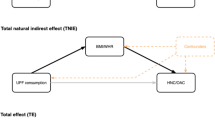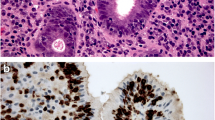Abstract
Objective: To investigate the relationship between green tea consumption and subsequent risk of gastric cancer at different anatomical subsites in a population-based prospective study.
Methods: The Japan Public Health Center-based prospective study (JPHC Study) was established in 1990 for Cohort I and in 1993 for Cohort II. Among 72,943 subjects (34,832 men and 38,111 women), 892 gastric cancer cases (665 men and 227 women) were identified from 1990 to 2001.
Results: While no association between green tea consumption and gastric cancer was observed among men, a decreased risk of gastric cancer was observed among women after adjustment for potential confounding factors. This result was more remarkable when only the tumors in the distal portion were analyzed; for that subsite, the relative risk was 0.51 (95% confidence interval 0.30–0.86) in the highest category of green tea consumption (5 or more cups per day versus less than 1 cup per day)(p for trend = 0.01). The null association for upper-third gastric cancer was consistent for both sexes.
Conclusions: An inverse association between green tea consumption and distal gastric cancer was observed among women. More prospective studies with detailed information are needed to confirm the role of green tea in the occurrence of gastric cancer.
Similar content being viewed by others
References
Hirohata T, Kono S (1989) Diet/nutrition and stomach cancer in Japan. Int J Cancer 10: 34–36.
Wang ZY et al. (1989). Antimutagenic activity of green tea polyphenols. Mutat Res 223: 273–285.
Xu Y, Ho CT, Amin SG, Han C, Chung FL (1992) Inhibition of tobacco-specific nitrosamine-induced lung tumorigenesis in A/J mice by green tea and its major polyphenol as antioxidants. Cancer Res 52: 3875–3879.
Wang ZY, Hong JY, Huang MT, Reuhl KR, Conney AH, Yang CS (1992). Inhibition of N-nitrosodiethylamine-and 4-(methylnitrosamino)-1-(3-pyridyl)-1-butanone-induced tomorigenesis in A/J mice by green tea and black tea. Cancer Res 52: 1943–1947.
Kohlmeier L, Weterings KGC, Steck S, Kok FJ (1997) Tea and cancer prevention: an evaluation of the epidemiologic literature. Nutr Cancer 27: 1–13.
Tsubono Y et al. (2001) Green tea and the risk of gastric cancer in Japan. N Engl J Med 344: 632–636.
Nagano J, Kono S, Preston DL, Mabuchi K (2001) A prospective study of green tea consumption and cancer incidence, Hiroshima and Nagasaki (Japan). Cancer Causes Control 15: 501–508.
HoshiyamaY et al. for the Japan Collaborative Cohort StudyGroup (2002) A prospective study of stomach cancer death in relation to green tea consumption in Japan. Br J Cancer 87: 309–313.
Tredaniel J, Boffetta P, Buiatti E, Saracci R, Hirsch A (1997) Tobacco smoking and gastric cancer: review and meta-analysis. Int J Cancer 72: 565–573.
Powell J, McConkey CC (1990) Increasing incidence of adenocarcinoma of the gastric cardia and adjacent sites. Br J Cancer 62: 440–443.
Blot WJ, Devesa SS, Kneller RW, Fraumeni JF (1991) Rising incidence of adenocarcinoma of the esophagus and gastric cardia. JAMA 265: 1287–1289.
MacDonald WC (1972) Clinical and pathologic features of adenocarcinoma of the gastric cardia. Cancer 29: 724–732.
Yang PC, Davis S (1988) Epidemiological characteristics of adenocarcinoma of the gastric cardia and distal stomach in the United States, 1973-1982. Int J Epidemiol 17: 293–297.
Tsugane S, Fahey MT, Sasaki S, Baba S (1999) Alcohol consumption and all-cause and cancer mortality among middle-aged Japanese men: seven-year follow-up of the JPHC Study Cohort I. Am J Epidemiol 150: 1201–1207.
Sobue T, Yamamoto S, Hara M, Sasazuki S, Sasaki S, Tsugane S, for the JPHC Study Group (2002) Cigarette smoking and subsequent risk of lung cancer by histologic type in middle-aged Japanese men and women: the JPHC Study. Int J Cancer 99: 245–251.
Sobue T, Yamamoto S, Watanabe S, for the JPHC Study Group (2001) Smoking and drinking habits among the JPHC Study participants at baseline survey. J Epidemiol 11 (Suppl): S44–S56.
Tsugane S, Sasaki S, Kobayashi M, Tsubono Y, Sobue T, for the JPHC Study Group (2001) Dietary habits among the JPHC Study participants at baseline survey. J Epidemiol 11 (Suppl): S30–S43.
World Health Organization (1990) International classification of diseases for oncology, 2nd edn. Geneva: World Health Organization.
Japanese Research Society for Gastric Cancer (1993) The general rules for the gastric cancer study, 12th edn. Tokyo: Kanehara.
Lauren P (1965) The two histological main types of gastric carcinoma: diffuse and so-called intestinal-type carcinoma. APMIS 64: 31–49.
Rothman KJ, Greenland S (1998) Modern Epidemiolog, 2nd edn. Philadelphia: Lippincott-Raven Publishers.
SAS Institute (1996) Changes and enhancement: release 6.11. Cary (NC): SAS Institute Inc.
Sasazuki S, Sasaki S, Tsugane S, for the Japan Public Health Center Study Group (2002). Cigarette smoking, alcohol consumption and subsequent gastric cancer risk by subsite and histologic type. Int J Cancer 101: 560–566.
Yu GP, Hsieh CC, Wang LY, Yu SZ, Li XL, Jin TH (1995) Greentea consumption and risk of stomach cancer: a population-based case-control study in Shanghai, China. Cancer Causes Control 6: 532–538.
Ji BT, et al. (1996) The influence of cigarette smoking, alcohol, and green tea consumption on the risk of carcinoma of the cardia and distal stomach in Shanghai, China. Cancer 77: 2449–2457.
Misumi A, Murakami A, Harada K, Baba K, Akagi M (1989) Definition of carcinoma of the gastric cardia. Langenbecks Arch Chir 374: 221–226.
Cheng KK, Day NE (1996) Nutrition and esophageal cancer. Cancer Causes Control 7: 33–40.
Kinjo Y et al. (1998) Mortality risks of oesophageal cancer associated with hot tea, alcohol, tobacco and diet in Japan. J Epidemiol 8: 235–243.
Munoz N, Victora CG, Crespi M, Saul C, Braga NM, Correa P (1987) Hot mate drinking and precancerous lesions of the oesophagus: an endoscopic survey in southern Brazil. Int J Cancer 39: 708–709.
Wahrendorf J et al. (1989) Precursor lesions of oesophageal cancer in adolescents in a high-risk population in China. Lancet ii: 1239–1241.
Kono S, Ikeda M, Tokudome S, Kuratsune M (1988) A casecontrol study of gastric cancer and diet in Northern Kyushu, Japan. Jpn J Cancer Res (Gann) 79: 1067–1074.
Inoue M et al. (1998) Tea and coffee consumption and the risk of digestive tract cancers: data from a comparative case-referent study in Japan. Cancer Causes Control 9: 209–216.
Tajima K, Tominaga S (1985) Dietary habits and gastro-intestinal cancers: a comparative case-control study of stomach and large intestinal cancers in Nagoya, Japan. Jpn J Cancer Res (Gann) 76: 705–716.
Yu GP, Hsieh CC (1991) Risk factors for stomach cancer: a population-based case-control study in shanghai. Cancer Causes Control 2: 169–174.
Setaiwan VW et al. (2001) Protective effect of green tea on the risks of chronic gastritis and stomach cancer. Int J Cancer 92: 600–604.
Huang JQ, Sridhar S, Chen Y, Hunt RH (1998) Meta-analysis of the relationship between helicobacter pylori seropositivity and gastric cancer. Gastroenterology 114: 1169–1179.
Helicobacter and Cancer Collaborative Group (2001) Gastric cancer and helicobacter pylori: a combined analysis of 12 case control studies nested within prospective cohorts. Gut 49: 347–353.
Tsubono Y, Kobayashi M, Sasaki S, Tsugane S (2003) Validity and reproducibility of a self-administered food frequency questionnaire used in the baseline survey of the JPHC Study Cohort I. J Epidemiol 13(Suppl): S125–133.
Tsugane S, Tei Y, Takahashi T, Watanabe S, Sugano K (1994) Salty food intake and risk of Helicobacter pylori infection. Jpn J Cancer Res 85: 474–478.
Author information
Authors and Affiliations
Corresponding author
Rights and permissions
About this article
Cite this article
Sasazuki, S., Inoue, M., Hanaoka, T. et al. Green Tea Consumption and Subsequent Risk of Gastric Cancer by Subsite: The JPHC Study. Cancer Causes Control 15, 483–491 (2004). https://doi.org/10.1023/B:CACO.0000036449.68454.42
Issue Date:
DOI: https://doi.org/10.1023/B:CACO.0000036449.68454.42




